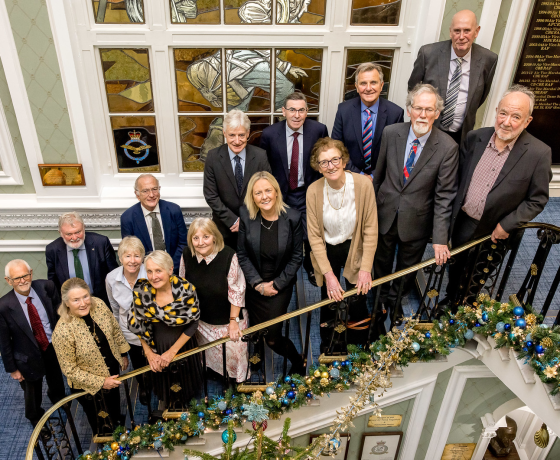
Honorary Fellows
Honorary Fellowship of the Nutrition Society is awarded to distinguished individuals, on a yearly basis who have made an outstanding contribution to the Society, and for their long term committment to nutritional science.
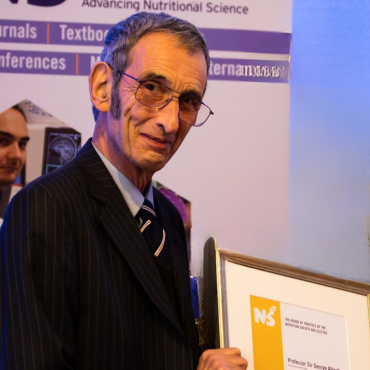
Professor Sir George Alberti is Chair of Diabetes UK, Senior Research Fellow at Imperial College and Emeritus Professor of Medicine at the University of Newcastle. He is also Clinical Adviser on Service Transformation for NHS London. Sir George has been President of the Royal College of Physicians, President of the International Diabetes Federation and of The European Association for the Study of Diabetes. He works extensively with the World Health Organization. He has been heavily involved in diabetes work in sub-Saharan Africa, particularly Tanzania, and in Mauritius. He has published more than 1,100 articles on diabetes and metabolism.
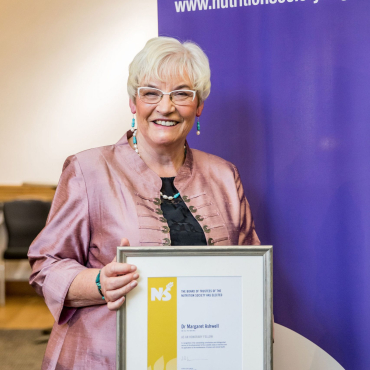
Dr Margaret Ashwell has viewed the relationship between food and health from all sides. She has been a Senior Research Scientist with the Medical Research Council, Principal of the Good Housekeeping Institute, and Science Director of the British Nutrition Foundation. She served on the UK Government’s Food Advisory Committee for 9 years. Margaret has run her own Company, Ashwell Associates Ltd since 1995. (www.ashwell.uk.com)
Margaret devised the Ashwell ® Shape Chart to focus attention on the health risks of central obesity. She acted as Research Co-ordinator for the Food Standards Agency's Research Programme on Nutrient Status and Function from 1994 to 2007. She has undertaken several reviews of FSA funded programmes and has acted as a scientific facilitator on many occasions.
Ashwell Associates have acted as disseminators in several EU projects including The EU Childhood Obesity Programme; Food in Later Life. They are currently disseminating results from the Early Nutrition Programming Project -EARNEST. They co-wrote the EARNEST and EURRECA proposals (European micronutrient recommendations aligned) and, in the latter, were responsible for ‘Integrating science and standards’.
A current role with industrial clients is to help them with the scientific substantiation of health claims. Margaret is the founder of a network for self employed nutritionists called SENSE.
Margaret lives in the village of Ashwell, near Cambridge UK, and is married with two daughters and two small grandchildren. Her passions are golf, tennis, football, cricket, photography and local history.
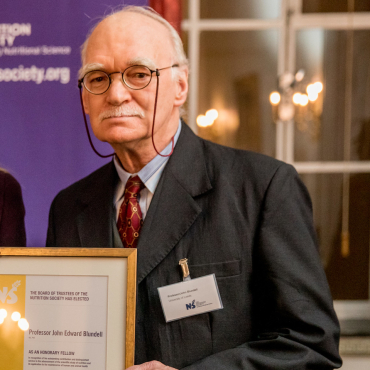
JB has a BSc in Psychology and a PhD in Neuroscience from the University of London (Institute of Neurology). He holds the Chair of PsychoBiology in the Faculty of Medicine and Health at the University of Leeds.
JB’s initial research concerned the relationship among brain mechanisms, foods and appetite control, and led to the development of the Satiety Cascade. Currently, the research is focussed upon the study of human appetite within an energy balance framework and has demonstrated that Energy Expenditure is a strong determinant of the Drive to Eat. Other research has included genetic studies on anorexia nervosa, the impact of physical activity on appetite, and mechanisms of action of anti-obesity drugs. The Leeds research team has developed several instruments for the evaluation of human appetite in the laboratory and the real world.
JB was a member of the UK government DSI Foresight Expert Group that developed the concept of the Obesities Systems Map as the basis for the Change for Life Programme; he was also a member of the DoH Expert Group on Social Marketing approach to childhood obesity. JB has been an expert consultant for ILSI and EFSA and has served on a number of Scientific Obesity Advisory Boards.
JB has received numerous prizes including the Johananoff International Fellowship, the Gino Bergami Prize, Sir David Cuthbertson Prize and the British Nutrition Foundation Prize. He has been visiting professor at the University of Ghent and Distinguished International Visiting Scholar at the University of Rhode Island. JB has been a long-standing scientific governor of the BNF, was a founding member of the European Association for the Study of Obesity, and in 2019 he received a Lifetime Achievement Award from UK ASO. In 2022 JB received the Wertheimer Award from the World Obesity Federation.

Director General of the British Nutrition Foundation since 2007; previously the Science Director (1998-2007). Professor Buttriss is a public health nutritionist, specialising in nutrition science communication and provision of targeted advice on the application of science to underpin nutrition strategies. She originally trained as a dietitian. She has longstanding links with several universities and, in 2018, was awarded an Honorary Fellowship by the Nutrition Society and is a Fellow and past trustee of the Association for Nutrition. She has contributed to the work of a number of government committees, most recently the Family Food Survey user group and committees concerning nutrient profiling, school food standards and the eatwell guide. She chairs BBSRC’s DRINC Steering Group and is a member of MRC’s UK Nutrition Research Partnership committee. She has first-hand experience of a number of food issues and their interaction with public health. She has written numerous reviews, articles and book chapters on a wide range of diet and health topics, as diverse as health claims, plant foods and health, child nutrition, healthy ageing, and environmentally sustainable diets.
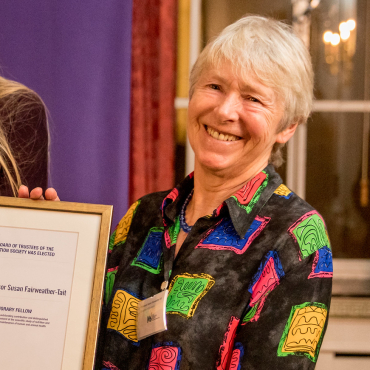
Professor Susan Fairweather-Tait is Professor of Human Nutrition, Norwich Medical School, the University of East Anglia (UEA). After graduating from Queen Elizabeth College, London, in 1978, she worked in the food industry for a short while before joining the Institute of Food Research, Norwich, and in 2007 she moved to UEA. Her main research interests are mineral metabolism and requirements, in particular iron, and she has over 300 peer-reviewed publications. She has served on a number of national and international advisory committees, including the COMA Panel on Dietary Reference Values, the European Food Safety Authority Panel on Nutrition, and the US NAS Committee on Harmonization of Methods for Estimating Nutrient Intake References. She is currently chair of the UK Nutrition and Health Claims Committee (2020-2023) and the FAO/WHO expert group on nutrient requirements for children aged 0-36 months (2020-present), and a member of the Scientific Advisory Committee for Nutrition (2021-2023), the Food Standards Agency Advisory Committee on Novel Foods and Processes (2020-2023), the Scientific Advisory Group for the New Nordic Nutrition Recommendations (2019-2022), the Technical Advisory Group for Global Anaemia Exemplars funded by the Gates Foundation (2020-2022), and the Big C Research Advisory Panel (2019-present). She was awarded the British Nutrition Foundation Prize in 1997 and elected a Fellow of the American Society for Nutrition in 2017.
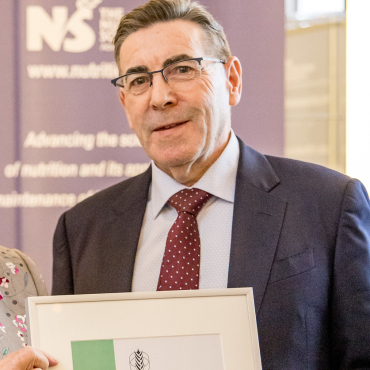
Professor Albert Flynn is Emeritus Professor in Nutrition in the School of Food and Nutritional Sciences, University College, Cork. He has served on the faculty of the University since 1981 and from 1993-96 he was Dean of the Faculty of Food Science & Technology. He has published widely on human nutrition, public health policy and regulation. He was Chair of the Food Safety Authority of Ireland's Scientific Committee from 2003-20. He has also served as a member of the European Food Safety Authority's Scientific Committee and as Chair of its Panel for Dietetic Products, Nutrition and Allergies from 2003-12 and as a member of the Scientific Committee on Food of the European Commission from 1997-2003. Professor Flynn has published over 200 papers, reviews, book chapters and books.
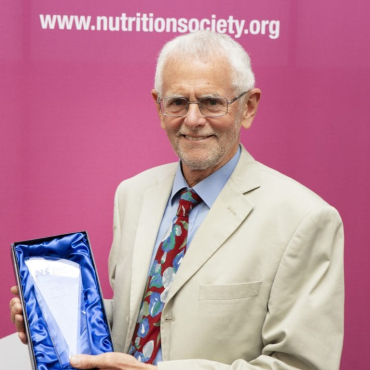
Professor Keith Frayn is an Emeritus Professor of Human Metabolism at the University of Oxford. In the scientific field of nutrition and metabolism, Keith is a highly respected contributor to the current understanding of fat metabolism, which has been the focus of his research for many years, as a member of the Oxford Centre for Diabetes, Endocrinology, and Metabolism (OCDEM). He was awarded the British Nutrition Foundation Prize in 2014 and was the first winner of the Nutrition Society's Blaxter Award in 2018. He is the author of the very successful textbook Human Metabolism: a Regulatory Perspective (2019, Wiley-Blackwell, with R.D. Evans), which is now in its fourth edition and illustrates how metabolic regulation allows the human body to adapt to many different conditions. More recently, he has published Understanding Human Metabolism (2022, CUP) and 'A Calorie is a Calorie' (2025, Little, Brown), aimed at the general public.
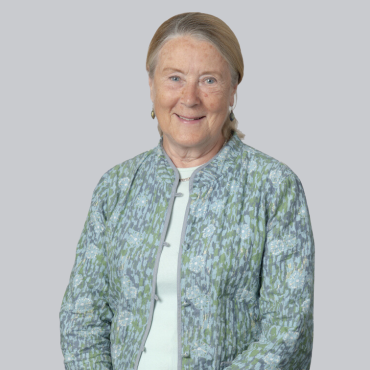
Professor Catherine Geissler was appointed Head of Department of Nutrition and Dietetics, King’s College London, in 1990-5 and Professor of Nutrition and Head of the Division of Health Sciences in 1994., She was made Emerita Professor of Human Nutrition in 2005. Professor Geissler served as director of the Higher Education Academy Subject Centre for Health Sciences and Practice 2000-2011. Prior to appointment as lecturer at King's College (pre-merger Queen Elizabeth College) Professor Geissler graduated BDS in Dental Surgery in Edinburgh and MS & PhD Human Nutrition in Berkeley, California and worked in San Francisco, Teheran, and Paris. She has served on many professional committees including Ministry of Agriculture, Food and Fisheries (MAFF) Food Advisory Committee, World Cancer Research Fund grants committee, and British and American Nutrition Societies. Professor Geissler’s appointment as President of the British Nutrition Society came to an end in August 2016. She was elected Secretary General of IUNS (2013-2017; 2017-2022). Outside of academia, Professor Geissler is a consultant to the food industry and to international development agencies including the World Bank, CGIAR, FAO, which involved work in Iran, Haiti, Mauritius, Sierra Leone, Niger, Benin, Senegal, Ghana, Ethiopia, Yemen, Thailand, Philippines, Singapore, Indonesia, Malaysia and China.
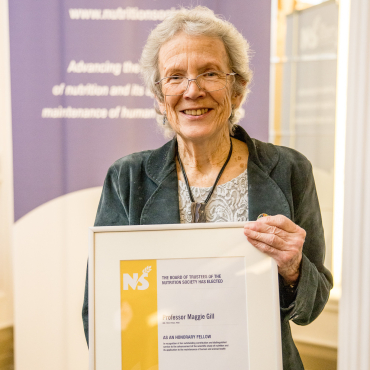
Professor Margaret Gill (Maggie) started her career as an animal nutritionist, studying agricultural science in Edinburgh University followed by a PhD from Massey University, New Zealand in sheep nutrition. Her research career progressed through dairy cow nutrition to an interest in global food security, and for the last 20 years a growing interest in the interface between science and policy. Maggie is a “big picture” thinker and advocates strongly for the importance of local context in designing research. She worked for the UK Department for International Development in the 90s and the 2010s, mainly on managing and advising on research projects and programmes. She was Chief Scientific Adviser (CSA) for Environment and Rural Affairs in the Scottish Government from 2006 – 2011 and currently (2022) chairs the Scottish Science Advisory Council and BBSRC’s Strategy Advisory Panel on Sustainable Agriculture and Food. In her CSA role she was a member of the Leadership Group which helped to develop Scotland’s first Food and Drink Strategy.

From 1972 to 2001 Leif Hambraeus was Professor of Human Nutrition, Faculty of Medicine, Uppsala University, Sweden. Since 2002 he has been affiliated as Senior Professor at the Department of Bioscience and Nutrition, Karolinska Institute, Stockholm, Sweden.
Dr Hambraeus was born in Stockholm, Sweden. After completing his PhD and MD degrees at the Karolinska Institute in Stockholm, he moved to the department of Pediatrics, University Hospital, Uppsala, where he established a metabolic unit for diagnosis and treatment of children with inborn errors of metabolism, which led him into the field of nutrition. He was appointed as the first Professor of Human Nutrition at Uppsala University and established a department of nutrition with special focus on infant nutrition and global nutrition problems. He was also engaged in the introduction of IT technology in global nutrition education programmes for academics in low income countries.
From 1973 until 1974 he was visiting professor at MIT, Boston, USA, which resulted in a very active cooperation for many years with colleagues in the USA, especially the late Professor Vernon Young. He is a member of the Royal Swedish Academy of Agriculture and Forestry and a foreign member of the Finnish Academy of Science and Letters. He is a Fellow of the American Society of Nutrition Science and of the Nutrition Society, London. He has been President of the Federation of European Nutrition Societies, the International Society for Research in Human Milk and Lactation, and the Third European Nutrition Congress. He is a board member of the International Union of Nutrition Sciences (IUNS) and emeritus member of the New York Academy of Sciences.
Area of research: protein and energy turnover in man using stable isotope technique, and indirect and direct suit calorimetry to study energy and protein interaction, and substrate utilization and its relation to physical activity.

Professor Hautvast studied both medicine and social anthropology at Radboud University in Nijmegen. After a training in tropical medicine he worked for a period of three years (1967–70) as medical officer in charge of a 72-bed Igogwe mission hospital in the south-western highlands in Tanzania. There he was confronted with serious nutritional health problems of people in that region. When he returned to Radboud Medical School he became interested in nutrition sciences.
He studied for a nutrition degree at Cambridge University/Dunn Nutrition Unit (1971–72). In 1972, he was appointed full Professor in Nutrition Sciences and Chairman of the Department of Human Nutrition at Wageningen University (WU). In 2000 he left WU and was succeeded by Professor Frans Kok as the new chairman. In 2000 he was appointed as Director of the Wageningen Centre of Food Sciences, a large public-private research institute. From 1994 to 2004 he served as Vice-President of the Health Council of the Netherlands. He was active in the International Union of Nutrition Sciences (IUNS) and served from 1985 to 1997 as Secretary-General. In 1996 he received the Royal Distinction of a Knighthood in the Order of the Dutch Lion. In 1983 he was appointed Correspondent Étranger Académie d’Agriculture de France. In 2004 he received the Honorary Doctorate at Potchefstroom University, South Africa. In 2005 he was appointed Fellow American Society Nutrition Sciences. Finally, he is proud to be the founding father of The European Nutrition Leadership Programme.

Prof Jeyakumar Henry is presently Senior Advisor, Singapore Institute of Food and Biotechnology Innovation, A*STAR (SIFBI). He spent over 35 years in the UK and arrived in Singapore in June 2011 as Founding Director of the Clinical Nutrition Research Centre (CNRC), A*STAR Singapore. Over a period of 9 years, he built an internationally recognized Centre with the primary focus of providing evidence-based science for the theme “Food the new medicine”.
He was the Founding Director of Functional Food Centre in Oxford and Professor of Human Nutrition from 1997-2011 at Oxford Brookes University. Initially trained as a Food Technologist, he subsequently obtained his M.Sc. and Ph.D. in Nutrition from the London School of Hygiene and Tropical Medicine (LSHTM). He was a Board Member of the UK Food Standards agency from 2000 – 2003, and a member of the general scientific advisory committee UK Food Standards agency from 2007 – 2011. He acted as a consultant to UNICEF in New Delhi, Beijing and New York on Optimization of Infant Feeding and also acted as a consultant to the Asian Development Bank on Nutritional Programming in China. He was Royal Society (UK) visiting Professor, Chinese University of Hong Kong, Nutritional Advisor to the Michelin Star Chef Raymond Blanc at Le Manoir aux Quat’Saisons.
His lifelong passion to combine food technology and nutrition culminated in him becoming the Editor-in-Chief, International Journal of Food Science & Nutrition (1996-2011), Editor-in-Chief of Advances in Food and Nutrition Research (2011-2016). His work on energy metabolism culminated in the development of the “Henry equations” to predict basal metabolic rate that is used worldwide. He continues his links with both UK and EU on collaborative activities on human nutrition.
His awards include:
2010 British Nutrition Foundation Award
2019 Institute of Food Technologists (IFT) - W.K. Kellogg International Food Security Award & Lectureship
2019 NutraChampion, NutraIngredients - Asia Award
2018 5th Niigata International Food Award, Grand Prix Award. Niigata International Food Award (Asian World Food Prize).

Professor Alan Jackson was appointed to the first Chair in Human Nutrition in an undergraduate medical school in the UK in 1985. He trained in paediatrics before taking up a post caring for severely malnourished children and carrying out research to determine the adaptive mechanisms that come into play in that condition and need to be addressed for successful therapy. His work help determine the needs for energy, individual macronutrients and micronutrients which contributed directly to the development of the World Health Organization guidelines for the treatment and prevention of severe malnutrition. These underlying principles were applied to the care of malnourished hospitalised patients in the UK leading to the establishment of effective nutrition support teams and eventually the recognition of intestinal failure as a condition requiring fundamental capability in nutritional care. He established the Institute of Human Nutrition and structured training in nutrition for undergraduate and postgraduate health professionals. He was the foundation Chair of the government body for risk assessment, the Scientific Advisory Committee on Nutrition. Currently he is Director of NIHR Southampton Biomedical Research Centre for Nutrition. His research has covered all aspects of human nutrition, with a strong focus on the use of stable isotopes to determine body composition and functional capability at the level of individual tissues and the whole body. For many years, he collaborated closely with David Barker to lay the nutritional foundations and molecular basis of the early life origins of adult disease. He was instrumental in the formation of the Intercollegiate Group in Nutrition, now the Academy Nutrition Group of the Academy of Medical Royal Colleges. He was the foundation President and Chair of the Association for Nutrition, the modern regulatory body for the nutrition profession which accredits training, holds a register and has as its primary objective protection of the public.
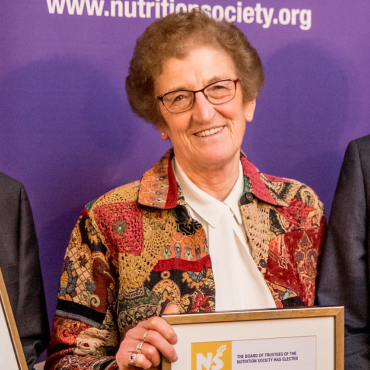
Professor Barbara Livingstone, BEd, MSc (Biology), MSc(Human Nutrition), PhD, is Professor Emerita of Nutrition at Ulster University and one of the founding lead academics within the Nutrition Innovation Centre for Food and Health (NICHE). She has been awarded a Senior Distinguished Research Fellowship by Ulster University.
Her main research interests include dietary and lifestyle risk factors for obesity and mechanisms of control of appetite, satiety and food intake following bariatric surgery and she has published over 150 peer-reviewed research papers. She has been a Scientific Governor of the British Nutrition Foundation and a member of the Scientific Advisory Committee, safefood (Ireland), the Northern Ireland Food Advisory Committee (Food Standards Agency), the Scientific Advisory Committee for the Food Safety Authority of Ireland (FSAI) Public Health Nutrition Sub-committee. She has contributed to several ILSI (Europe and US) taskforces and has chaired the Data and Research Advisory Group of the N. Ireland Obesity Prevention Steering Group. She is a former treasurer and chairperson of the Irish Section of the Nutrition Society.
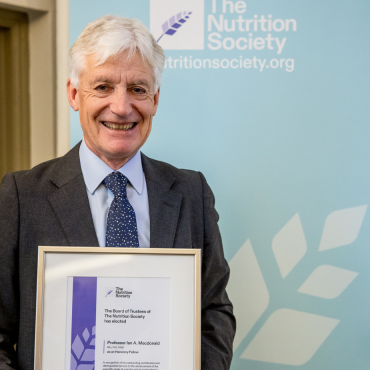
Ian Macdonald is Professor Emeritus in Metabolic Physiology at the University of Nottingham, UK. He obtained a BSc in Physiology & Chemistry in 1973 and a PhD in Physiology (supervised by Mike Stock) in 1977, both from Queen Elizabeth College, University of London. He was an academic member of staff in Nottingham between 1977 and 2020, and Professor of Metabolic Physiology from 1991 to 2020. During his time at Nottingham he was Head of the School of Biomedical Sciences (1997-2002) and of the School of Life Sciences (2013-2017), as well as being Director of Research in the Faculty of Medicine and Health Sciences (2006-2013). He has served on external advisory boards and committees for Health Charities, EU, UK Government, Research Councils in the UK and other European countries. This included being a member of the UK Scientific Advisory Committee on Nutrition (Department of Health and Social Care) from 2007-2020, where he chaired the sub-committee which produced the Carbohydrates and Health Report in 2015. He has published over 410 peer-reviewed original research papers, together with reviews, book chapters and invited contributions. He was President of the UK Nutrition Society from 2007-2010, was Treasurer of FENS from 2011 to 2019, and of the World Obesity Federation from 2009 to 2019. He was joint Editor of the International Journal of Obesity from 2000 to 2021, and is a Fellow of the Royal Society of Biology, a Registered Nutritionist and an Honorary Fellow of the Association for Nutrition, a Fellow of the Physiological Society, and a Fellow of the International Union of Nutritional Sciences. He was awarded the BNF Prize in 2017.
His research has focused on the functional consequences of metabolic and nutritional disturbances in health and disease, with specific interests in obesity, diabetes, cardiovascular disease and exercise, predominantly in healthy individuals and patients. The research has involved collaborations with clinical Academic colleagues and NHS clinicians, both within Nottingham and elsewhere. This work has been funded by grants from Research Councils, Medical Charities, EU (FP5 and FP7), as well as the Pharmaceutical and Food Industries. The research has involved supervision of over 50 non-clinical and clinical researchers studying for PhD or MD/PhD degrees.
A major feature of his research has been the study of multiple body systems to evaluate whole body responses. The early work involved assessing the physiological consequences (mainly on thermoregulation and BP regulation) of metabolic and nutritional disturbances such as starvation, undernutrition, hypoglycaemia and prolonged exercise. More recent work has focussed on the metabolic aspects of diabetes and obesity, including the effects of diet composition and weight loss, and the impact of dietary supplements on carbohydrate and lipid metabolism, and of the effects of surgical trauma and of immobilisation on insulin sensitivity and whole body metabolism.
Two major areas of current interest relate to the use of MR imaging and spectroscopy for assessing alterations in metabolism and the influence of nutrients and metabolic disturbances on gene expression in adipose tissue and muscle. Current work in these areas relates to physical activity and inactivity (including immobilisation), obesity and diabetes.
After retiring from the University of Nottingham in 2020, he was appointed as the Scientific Director of the Nestle Institute of Health Sciences in Lausanne, Switzerland, and after retiring from that post in 2022 he became and external member of the Nestle Research Scientific Advisory Board and the Science and Technology Advisory Council.
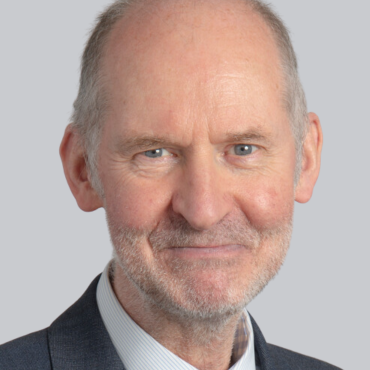
President from 2001 to 2004
Professor Mathers is Professor of Human Nutrition, Director of the Human Nutrition Research Centre and Director of the Centre for Healthier Lives in Newcastle University. He was an undergraduate in Newcastle and undertook his PhD and post-doctoral research in the University of Cambridge followed by a Research Fellow post in Edinburgh University before being appointed in Newcastle. His major research interests are in understanding how eating patterns influence risks of age-related diseases including heart disease, diabetes, dementia and bowel cancer. He uses genomic and epigenomics approaches to understand the mechanisms though which nutrition influences cell function and, ultimately, health.
Professor Mathers has a long-term interest in developing and implementing large scale human intervention studies to improve healthy ageing (The LIVEWELL Programme), and to reduce the risk common age-related diseases including bowel cancer (The CAPP Studies) and dementia (MedEx-UK). He led the EU-funded Food4Me intervention study which used a web-based approach to deliver a personalised nutrition intervention across 7 European countries.
Among his external roles, Professor Mathers was President of the Nutrition Society and served on numerous grants panels and other committees for the MRC, BBSRC, ESRC, World Cancer Research Fund and other research funders. He is a Trustee of the British Nutrition Foundation and of the Rank Prize Funds. Professor Mathers is Editor-in-Chief of the British Journal of Nutrition.
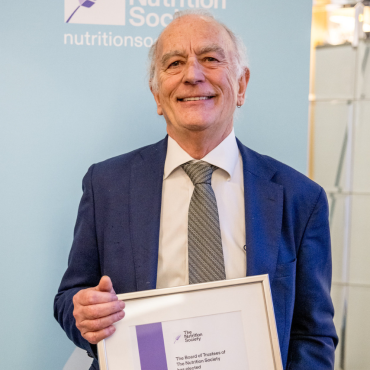
Harry McArdle graduated in Physiology from the University of St Andrews and received his PhD from the same University. After a post-doc at the University of Western Australia, Harry worked as a Senior Scientist at the Murdoch Institute for Research into Birth Defects in Melbourne. He returned to Scotland, to the University of Dundee in 1990 and was the first non-clinical lecturer in the Dept of Child Health. Harry moved to the Rowett Research Institute in Aberdeen first as group leader, then Head of Division and finally as Deputy Director, retiring in 2015. He was Secretary, Treasurer and Member without Portfolio of the Nutrition Society and was a member of the group that initiated the AfN. He was also a founder Trustee and Chair of Trustees of the Academy of Nutrition Sciences. Currently he is Vice Chair of the Nutrition and Dietetics Panel and the Novel Foods Working group for EFSA and is also a member of the ACNFP for the FSA in the UK. Harry’s research has concentrated on the role of micronutrients, mainly iron and copper, on fetal growth and development especially in relation to transport across the placenta.
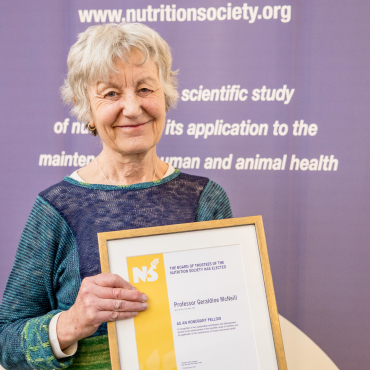
Geraldine McNeill BA MB ChB MSc PhD RNutr (Public Health) FAFN is Visiting Professor of Global Nutrition and Health at the University of Edinburgh. Her interest in nutrition was sparked when she was an undergraduate medical student at the University of Cambridge where her dissertation was supervised at the Dunn Nutrition Laboratory. Following this Geraldine spent a year as a volunteer with Save the Children Fund in Burkina Faso, which brought home to her the linkages between agriculture, nutrition and health in resource-poor settings. After completing her medical training she returned to nutrition through postgraduate study at the London School of Hygiene and Tropical Medicine, carrying out her PhD research in rural S India.
Geraldine spent much of her academic career in Aberdeen, initially at the Rowett Research Institute where she led the establishment of a residential human nutrition unit and whole body calorimetry facilities and carried out studies of body composition, energy intake and expenditure, and later at the University Medical School where she held appointments in research and teaching in Public Health Nutrition. She led a Public Health Nutrition research group of 20 post-doctoral scientists and PhD students and carried out longitudinal studies of diet and health outcomes including asthma, cardiovascular disease, cancer and cognitive decline as well as large-scale surveys of children’s diet in Scotland.
Since 2017 she has enjoyed a new role at the Global Academy of Agriculture and Food Security at the University of Edinburgh which allows her to continue research, teaching and mentoring in a multidisciplinary academic environment.
Geraldine is a Trustee of the Association for Nutrition and was Registrar of the Association from 2015-19.
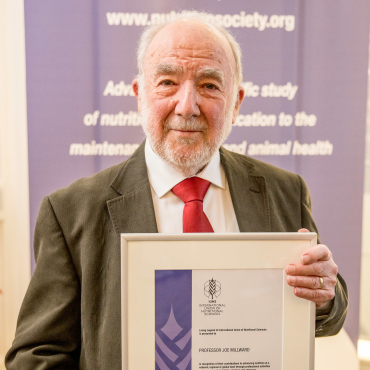
Professor Millward trained as a biochemist (Cardiff, 1966) and worked with Professor John Waterlow, at the MRC Tropical Metabolism Research Unit in Jamaica and at the London School of Hygiene and Tropical Medicine (1970–1992). He was appointed to the chair of Human Nutrition at the University of Surrey in 1992 – undergraduate teaching in Nutrition, Nutrition and Dietetics, Nutrition and Food Science; postgraduate teaching in Nutritional Medicine.
From 2008, he became Emeritus Professor and has had much involvement with The Nutrition Society by serving as council member during 1978–1982, 1993–1998 and 2002–2005, and as the Society’s representative on the Royal Society National Committee for Biochemistry from 1976 to 1982. He also served on the editorial boards of the British Journal of Nutrition, (1976–1982, 1993–2002, and since 2012 as Deputy Editor), and Nutrition Research Reviews, (1987–2002).
Professor Millward has been involved in the following national and international activities:
- Chair: Association of Professors of Human Nutrition (1999-2003)
- Member of COMA Panel on UK nutrient requirements (energy and protein) (1988-1991)
- Member of FAO/WHO Expert consultations on protein quality (1989, 2013)
- Co-Chair of WHO/FAO/UNU Protein and amino acid requirements in Human Nutrition (2001-2007)
- Special consultant to SACN for Dietary Reference Values for Energy (2009-2012) and for Military dietary reference values for energy (2016)
- Visiting Professor to St Georges Medical School, Grenada (2006-current)
- Publications >250 (h-index: 53) on protein turnover, muscle and bone growth regulation, macronutrient metabolism and requirements, especially protein, amino acids and energy; The aetiology and management of obesity, EFA metabolism and CHD risk; and Animal source food reduction and climate change mitigation.

Hilary's research is concerned with the mechanisms for involvement of B vitamins in the pathophysiology of disease, including cancer, and in the development of functional biomarkers of micronutrient status. Her team is currently examining the role of dietary methyl donors as modulators of epigenetic change and gene expression, in cancers of the cervix and the breast.
She is a Member of the Expert Panel for WCRF/AICR Report into links between diet, physical activity and cancer and subsequent Policy Report, and a member of the Department of Health Project Board for the National Diet and Nutrition Surveys of the UK population. She sits on the UK Government’s Scientific Advisory Committee on Nutrition and is Chair of the DoH working group reviewing the vitamin D requirements of the UK population.

Professor Ann Prentice is an Honorary Senior Visiting Fellow of the MRC Epidemiology Unit at the University of Cambridge MRC Epidemiology Unit. She is the former Director of the MRC Elsie Widdowson Laboratory (previously MRC Human Nutrition Research), Cambridge, and was Programme Leader of the MRC Nutrition and Bone Health Research Group, Cambridge, and Head of the Calcium, Vitamin D and Bone Health research team at MRC Unit The Gambia.
Ann is a research scientist with a strong commitment to the translation of scientific evidence into policy and practice. She was Chair of the UK Scientific Advisory Committee on Nutrition 2010-20 and holds, or has held, other official positions and memberships of Government Committees, Royal Colleges and International Agencies; Research Councils and Universities; Learned Societies and Research Charities.
Her research is focused on lifecourse nutritional requirements for population health, with an emphasis on calcium and vitamin D, and encompasses the nutritional problems of both affluent and resource-limited societies. She has been involved in projects studying pregnant and lactating women, children, adolescents and older persons in the UK, The Gambia, Uganda, Malawi, Kenya, China, Bangladesh, India and South Africa. She has published >350 peer-reviewed articles, plus contributions to book chapters and government reports, the latter most notably in relation to her close involvement with the National Diet and Nutrition Survey since 1992.
In addition to the University of Cambridge, Ann has honorary and visiting appointments at the MRC Unit The Gambia at the London School of Hygiene and Tropical Medicine, the MRC Laboratory of Molecular Biology in Cambridge, the University of Witwatersrandin South Africa, and Shenyang Medical College in China, and she was the Honorary Professor of Global Nutrition and Health at the University of Cambridge from 2017-19. She was awarded an Honorary Doctorate of the University of Surrey in 2014 and was appointed OBE in the Birthday Honours List in 2006.
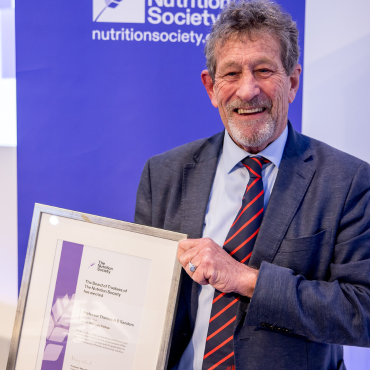
Professor Tom Sanders graduated from Queen Elizabeth College with a BSc (Nutrition) in 1971 and then spent two years in Indonesia working for UNICEF on its nutrition programme on voluntary service overseas. On return to UK, he completed his PhD from the University of London working at Kingston Hospital under the supervision of Dr Frey Ellis and Professor John Dickerson studying the health and essential fatty acids metabolism in vegans compared with omnivores.
The award in 1977 of a Rank Prize Fund Fellowship enabled him to continue his research on long-chain polyunsaturated fatty acids under the supervision of Professor Don Naismith at Queen Elizabeth College. He subsequently joined the academic staff of the Nutrition Department in 1982 which a few years later merged with King’s College. He developed fruitful collaborations with the MRC Epidemiology and Medical Care Unit at Northwick Park Hospital, notably with Professor Andrew Haines, Professor George Miller and Professor Kennedy Cruickshank and with Professor Gilbert Thompson at the MRC Lipid Metabolism Unit, Hammersmith Hospital.
He was appointed Reader in Nutrition in 1991 by the University of London before being appointed to the established Chair as Professor of Nutrition & Dietetics at King’s College London in 1994. He was awarded a Doctor of Science by the University of London in 1996 in recognition of his research on dietary lipids and vegetarian health. He served as Head of the Department of Nutrition and Dietetics from 1995-2000 before taking up the role as Head of the Nutritional Sciences Research Division. He retired in 2014 as Head of Diabetes and Nutritional Sciences Research Division in the School of Medicine. On retirement, King’s College London conferred the title of Emeritus Professor of Nutrition & Dietetics.
He served on the Council of the Nutrition Society and was the Society’s representative on the Parliamentary Food and Health Forum for several years. He also played a leading role in organising meetings of the Nutrition Society held at King’s College London. He acted as a consultant to several food companies and served on several national (ACNFP, Joint Health Claims Initiative) and international expert committees (FAO/WHO Consultations on Oils and Fats in Human Nutrition 1993, 2008; ILSI BRAFO project), and British Nutrition Foundation Task Forces (Trans Fatty Acids, Unsaturated Fatty Acids, Iron and chaired the Task Force Nutrition and Development-–short- and long-term consequences for Health). His research career mainly focused on the effects of diet especially lipids in relation to cardiovascular health, but he has retained an interest vegan/vegetarianism.
He was principal investigator in some large randomized controlled trials on dietary modification on risk factors for cardiovascular disease (OPTILIP, MARINA, CRESSIDA). He has published over 400 scientific papers, authored several books (the Vegetarians Healthy Diet book, The Food Revolution, You Don’t Have to Diet, the Molecular Basis of Human Nutrition, Functional Dietary Lipids) and contributed chapters on the effects of diet on risk of cardiovascular in leading textbooks. He has supervised 32 doctoral theses and still enjoys teaching. Throughout his career, he has regularly engaged with the media concerning the nutritional sciences and continues to do so in his retirement.

Professor Wim H.M. Saris MD, PhD is Professor Emeritus Human Nutrition at the Department of Human Biology, at the Faculty of Health, Medicine and Life Science Maastricht University, The Netherlands
Having graduated from Wageningen University with an MSc in Human Nutrition in 1974, He studied Medicine at Radboud University in Nijmegen where he got his MD degree in 1978. There he was awarded a PhD in 1982 for work on aerobic power and daily physical activity in children aged 4 – 18 years.
He then moved to Maastricht University as Assistant Professor in the Department of Human Biology. In 1984, he was appointed as Professor of Human Nutrition. In 1992, he initiated the Nutrition and Toxicology Research Institute NUTRIM at the university and was the scientific director till 2005. From 2005 till 2014, he was part-time Corporate Scientist Human Nutrition at DSM, Food Specialties biotech division in Delft. From 2009 -2016 he was Scientific Director of the Nutrition and Health program at the Top Institute Food and Nutrition (TIFN) Wageningen. In 2014 he received the Dutch Royal Distinction of Officer in the Order of Orange-Nassau
He served many national and international committees among others the Dutch Health and Nutrition Council and the European Food Safety Authority (EFSA), chairing the committee on Nutrition, the European Technology Platform (ETP) initiative “Food for Life” and was the first chairman of the EU Joint Programming Initiative (JPI) “Healthy diet for a healthy life”. He recently stepped down as president of ILSI Europe in Brussels. Since 2016, he is emeritus professor Human Nutrition at the Maastricht University.
He published over 500 papers, reviews, book chapters and books, dealing with topics like nutrition, energy metabolism, exercise physiology in particular sports nutrition, cancer cachexia, functional foods and nutrigenomics.
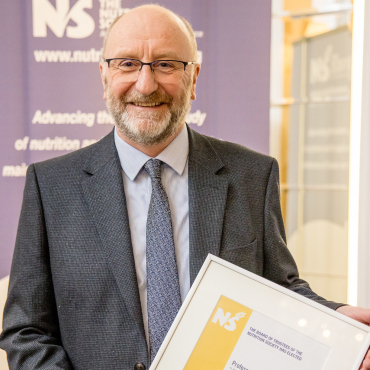
Chris Seal is Emeritus Professor of Food and Human Nutrition at Newcastle University.
Chris joined the University in 1983 as a Demonstrator in Agricultural Biochemistry and Nutrition and then spent 11 years researching energy metabolism in ruminant gut and liver, publishing key papers describing how tissues respond to changes in nutrient supply. In 1994 he was appointed to a lectureship in human nutrition working with colleagues to develop the University’s Human Nutrition Research Centre. He was promoted to Professor of Food & Human Nutrition in 2008.
Chris is best known for his research on cereal and carbohydrate nutrition; in particular he is an acknowledged international expert on whole-grain nutrition. He has managed some of the largest whole-grain intervention studies worldwide with funding from the Food Standards Agency, Public Health England and Industry. His work underpins efforts to establish legal definitions of ‘whole grain’ and ‘whole-grain food’ and he is a member of an International Task Force promoting whole grain consumption and setting national and international dietary intake recommendations. His broader research interests have been driven by multidisciplinary collaborations including clinical nutrition during cancer treatment and the impact of diet on relapse in ulcerative colitis, functional properties of plant secondary metabolites, effects of production systems (organic vs conventional) on food quality and health, and the effects of consumer behaviour on food choice.
Chris has made significant contributions to nutrition training at both UG and PG levels. He was a key member of the group which developed the BSc Food & Human Nutrition (FHN) degree programme at Newcastle in 1991 and was Degree Programme Director for more than 13 years. During this time he worked with the Association for Nutrition to develop course accreditation criteria, using the Newcastle degree as an exemplar. He also developed the programme for delivery in Singapore in collaboration with the Singapore Institute of Technology. His expertise as an academic leader is reflected in his role as External Examiners for nutrition programmes across the UK, Ireland and Hong Kong. At a PG level Chris has successfully supervised 35 PG research students (32 PhD and 3 MD).
Chris has worked throughout his career to promote the nutrition discipline and to encourage the use of evidence-based nutrition to the wider public. He is a regular contributor to media coverage of nutrition issues including for the BBC, in the popular press and on social media. He promotes healthy diets and nutrition to schools in the region, often bringing pupils into the University and encouraging them to consider university courses in STEM subjects. He has held many senior roles within the Nutrition Society, as a member of Council, Programmes Secretary, Scientific Development Officer and Treasurer. Chris has developed strong links with industry and has been an advisor to several national and multi-national food companies. He was a member and Chair of several MRC and BBSRC panels, and was an external reviewer for many National and International funding agencies.
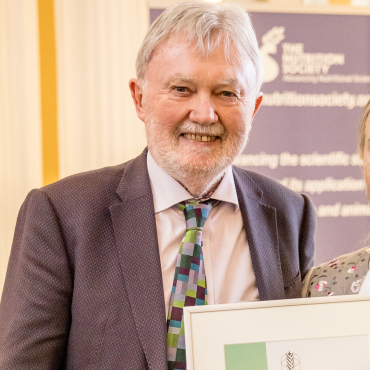
After graduating with a BSc (Chemistry), BAgr (Agricultural Chemistry) and PhD (Nutrition Biochemistry), from Queen’s University, Belfast, he spent several years (1977-1980) in academia in Australia before joining his current institution in 1981. He was appointed to Professor of Human Nutrition in 1994 and was Director of the Northern Ireland Centre for Food & Health (NICHE) from 2006-2015. He has attracted over £35M in research grants and is an author of over 250 peer-reviewed research publications. In 2002, he was elected a member of the Royal Irish Academy and was the 23rd President of the Nutrition Society (2010-2013). In 2014, Professor Strain was appointed Order of the British Empire for services to nutrition research and education. Other prizes include the British Nutrition Foundation Prize 2012 and the William Evans Fellowship, University of Otago, New Zealand. He was President of the Board of the European Nutrition Leadership Programme, Luxembourg (2010-2015), Vice-Chairman, Panel on Dietetic Products, Nutrition and Allergies (NDA), and Chairman, of the NDA Working Group on Claims, European Food Safety Authority (EFSA) Parma (2006-2015). He chairs the International Science Advisory Panel for the New Zealand Government funded, High Value Nutrition Programme.

Dr Alison Tedstone is Chief Nutritionist (National Director of Diet & Obesity) with responsibility of diet, nutrition and obesity in the Health and Wellbeing Directorate of Public Health England (PHE). Her teams work areas include the National Diet and Nutrition Survey, nutrient composition of foods, scientific advice on nutrition (including the Scientific Advisory Committee on Nutrition), and messaging on nutrition and health issues. Dr Tedstone has a BSc and PhD from University of London. Before working for Public Health England Dr Tedstone worked at the Food Standards Agency (FSA) as Head of Nutrition Science. She is on the UK Voluntary Register of Nutritionists held by the Association for Nutrition as a Registered Nutritionist (public health) and as a Fellow.
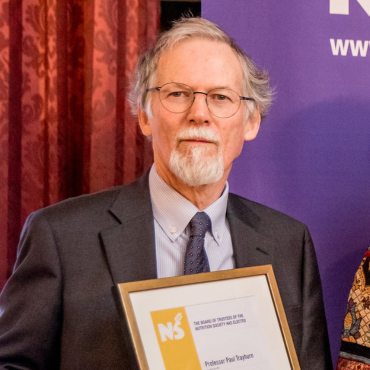
Professor Trayhurn, Emeritus Professor of Nutritional Biology at the University of Liverpool, entered nutrition research in 1975 on joining the MRC Dunn Nutrition Laboratory in Cambridge. His subsequent appointments include: Professor and Heritage Scholar in Nutrition and Metabolism, University of Alberta; Head of the Division of Biomedical Science, Rowett Research Institute, Aberdeen; Professor and Director of the Obesity Biology Unit, University of Liverpool. He has been a Honorary/Staff/Visiting Professor at several other institutions, including the Universities of Aberdeen, Buckingham, Oslo and Sydney. From 2014-16, he held a Distinguished Scientist Fellowship at King Saud University, Saudi Arabia.
In 1997, he was elected to Fellowship of the Royal Society of Edinburgh; his other awards include the Friedrich Wasserman Award (2008) from the European Association for the Study of Obesity and the inaugural Gowland Hopkins Award from The Nutrition Society (2019). He has served on a number of national and international scientific committees including the BBSRC Agri-Food Committee, the MRC Population and Systems Medicine Board and the Royal Society’s Research Grants Board (Biological Sciences), as well as chairing the Scientific and Awards Committees of the International Association for the Study of Obesity. He is a former Editor-in-Chief of the British Journal of Nutrition and Trustee of the Nutrition Society. His research interests have centred on energy metabolism, obesity and adipose tissue function – areas in which he has published >300 peer-reviewed papers and review articles, many of which are highly cited.

Professor Wahlqvist was educated at Adelaide and Uppsala Universities. He is a Consultant Physician and has held chairs in Human Nutrition, Medicine, Epidemiology and Preventive Medicine at Melbourne’s Deakin and Monash Universities. He has been Chair of Internal Medicine at Prince Henry’s Hospital, then of the Monash Medical Centre in Melbourne, as well as Director of the APHNC (Asia Pacific Health & Nutrition Centre) at the MAI (Monash Asia Institute) and of the FAO Centre of Excellence in Food Safety at Monash University. He has also held appointments at the Karolinska Institute in Sweden, the University of Indonesia and Zhejiang University in China.
He was President of the International Union of Nutritional Sciences (IUNS), Chair of the Australian Nutrition Foundation (Nutrition Australia), Foundation Chair of the WMCACA (Weight Management Code Administration Council of Australia), a Board member of ANZFA, the Australian and New Zealand Food Authority (now FSANZ), Foundation Chair of the Food Safety Council of Victoria, Chair of the Australian Academy of Science National Nutrition Committee, and Foundation Editor-in-Chief of the Asia Pacific Journal of Clinical Nutrition. His advisory board memberships have included the Harvest Plus program (International Food Policy Research Institute in Washington DC), the Riddet Food Research Institute at Massey University, New Zealand and the WHO Nutrition Advisory panel.
He has been recognised with awards by the nutrition societies in Australia, Britain, the USA, Taiwan, Indonesia and China. He was awarded the Charlotta Medal by the Swedish Emigrants Research Institute and made an honorary Bataknese.
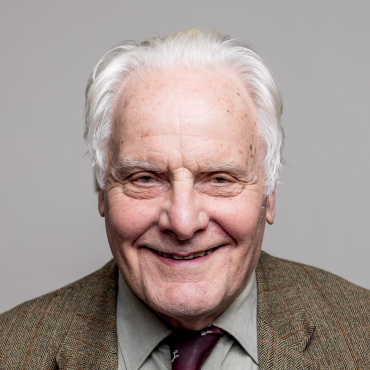
John Webster MA, VetMB, PhD, MRCVS, FNS,FAfN
John Webster, trained as a vet, began a research career with Sir Kenneth Blaxter (KB) at the Hannah Research Institute, Ayr, studying the impact of cold stress on energy metabolism in ruminants. This led him to the University of Alberta, Canada, where it was really cold, but he was allowed to teach cowboys. However, KB persuaded him to return to the Rowett Institute, Aberdeen where his interests ranged from ruminant digestion to appetite control and the energetics of protein and fat deposition in the rat.
In 1977 he was appointed to the Chair of Animal Husbandry at the University of Bristol, where he established a unit for the study of animal behaviour and welfare, which has achieved international acclaim. He was a founder member of the U.K. Farm Animal Welfare Council and first propounded the ‘Five Freedoms’ which have gained international recognition as standards for defining the elements of good welfare in domestic animals. He is a past president of the Nutrition Society and British Society for Animal Science.
He became Emeritus (i.e. unpaid) Professor in 2005 and has since sought to contribute mostly through writing. Recent books include Management and Welfare of Farm Animals (editor), Understanding the Dairy Cow, Animal Husbandry Regained and, in the Animal Welfare series, Limping towards Eden, and Understanding Sentient Minds and why it matters.

Professor Roger Whitehead PhD, FRSB, FRCP, FRCPCH, FAfN, CBE was Director of the MRC Dunn Nutrition Unit at Cambridge and Keneba, The Gambia, from 1973 to 1998.
Prior to that he was Director of the MRC Child Nutrition Unit in Uganda from 1968 to 1973. He is also a Fellow and a past Vice-Master of Darwin College, Cambridge. He is a past Chairman of Council of the British Nutrition Foundation. He has had close academic links with a number of nutrition departments in British universities as well as in Uganda and China.
His personal area of research was Maternal and Child Nutrition, especially in the developing world covering of states of malnutrition such as kwashiorkor and marasmus as well as the relationship between diet and healthy pregnancy and lactation outcomes.
As a member of the Department of Health Committee on Medical Aspects of Food Policy, he chaired the panel which produced the Report on Dietary Reference Values for Food Energy and Nutrients for the United Kingdom, published in 1991. He has also served as an advisor on various WHO, FAO and UNU committees.
Although not medically qualified, he is an Honorary Fellow of the Royal College of Physicians and an Honorary Fellow of the Royal College of Paediatrics and Child Health. Since 1973, he has been a Fellow of the Institute of Biology (now FRSB) and from 1998 a Fellow of the International Union of Nutritional Sciences (IUNS). In 1992, he was appointed a CBE.
In retirement his main academic links have been back in Uganda at the School of Food Technology, Nutrition and Bioengineering at Makerere University, where he helped to set up a Master’s degree course in Applied Human Nutrition.
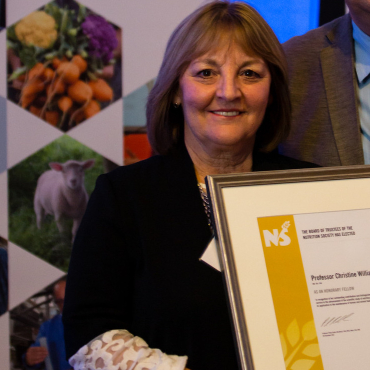
Professor Christine Williams BSc, PhD, FAfN, FRSB, FIUNS, OBE is a Professor of Human Nutrition at the University of Reading.
Her research is revolves around understanding the impact of dietary fats on human health, particularly in relation to cardiovascular disease and insulin resistance. She also has particular interest in enhancing population health through food chain approaches to nutrition from agriculture, manufacturing and food innovation, marketing and communication.
She is frequently involved in providing advice to government and industry on matters relating to dietary policy and actively engages in dissemination of nutritional science to the public.
She is member of a number of expert and advisory committees. In the UK she is a Member of the Governing Body of the British Nutrition Foundation, has chaired the BBSRC Agri-Food Committee, sits on the BBSRC Appointments Board and was a member the Scientific Advisory Committee on Nutrition’s (SACN) working group on saturated fats.
She was awarded the Royal Society of Medicine’s Gold Medal in Nutrition in 1999, and awarded an OBE in the Queen’s Honor’s list in 2013 for her contribution to Higher Education and nutritional sciences.
She has received various honours, and is an elected Fellow of the Society of Biology, the Association for Nutrition and the International Union of Nutritional Sciences respectively.
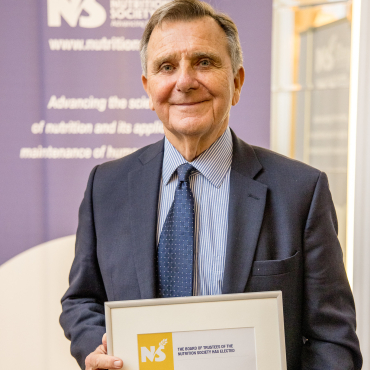
Professor Clyde Williams is emeritus professor of sports science at Loughborough University and visiting professor at the newly established University of Suffolk. During his 30 year-long career at Loughborough University he has had several senior roles including head of the School of Sport and Exercise Sciences and Pro-Vice Chancellor (research). Prior to his move to Loughborough, to set up sports science research, he spent nine years in the Department of Physiology at the University of Aberdeen, teaching science and medical students’ human physiology. His research focussed, at the time, was on the impact of thyroid hormone on skeletal muscle fibre composition.
At Loughborough his research returned to an earlier interest in the influence of nutrition on exercise performance and recovery. Along with his Scandinavian colleagues, he contributed to the early literature showing links between glycogen metabolism and fatigue. In the early 1980s, he served as secretary to the Nutrition Society’s scientific programmes committee, when Professor John Waterlow was president. He was appointed to the first chair in sports science in the UK (1986). He was the founding chair of the British Association of Sport and Exercise Sciences (BASES) and latterly, the founding chair of the Board for registration for professionals in sport and exercise nutrition (SENr). He chaired the 2008 RAE panel for sport related subjects. He was appointed as the Vice-Chancellor’s Fellow and adjunct professor at Victoria University (Melbourne) during the development of their Institute of Health and Performance. Professor Williams has been international visiting professor at the Vrije University of Brussels and the J.W. Barker International visiting Professor at the Nanyang Technical University of Singapore.
He was appointed OBE in the Queen’s birthday honours in 2009, awarded an honorary fellowship of the Faculty of Sport and Exercise Medicine (UK) for his contributions to the development of sports medicine education (2011). Professor Williams was also awarded a DSc (Hon) by Loughborough University (2014) and an honorary doctorate by Victoria University (2016). He continues to review manuscripts, grant applications, and mentor early career researchers.
